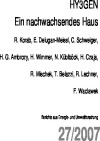Suchergebnisse für "Factsheet: Energietechnologien gestalten, die für alle sinnvoll und nutzbar sind"
BIM2BEM Flow - Continuous BIM-based energy efficient planning
Automated integration and assignment of exchange requirements between the design and simulation programs, based on the elaborated exchange information requirements, should enable continuous energy efficiency planning along the design phase.
NaNu3 - Parametric Planning for a Sustainable Roof (Blue, Grey and Green)
Demonstration of the feasibility and validation of a parametric model that can evaluate the practical and financial feasibility of the combined use of roof areas as well as its microclimate and environmental effectiveness at an early planning stage.
School vent cool - Ventilation, cooling and strategies for high performance school renovations
Based on a building typology, strategies for prefabrication for high-quality thermic-energetic renovation of school buildings were developed. New solutions for ventilation systems to achieve good air quality and shading systems were analysed and tested. The "School vent cool" method for renovation of schools has been developed.
Ecoleasing for technical commodity goods - Models of use on the example of abrasives
The aim of the project is, to come to general expressions on one hand of the market potential and on the other hand of the restrictions for ecoleasing in the field of technical commodity goods. Within the project an evaluation on the relevance of ecoleasing for the sustainable development will also be done.
BuildReUse ‐ 100 percent re‐use and recycling in buildings with short usage cycles
Some buildings, such as supermarkets or office buildings, are often demolished and rebuilt after a few years or at least have their interiors changed, turning large quantities of building components into waste. The BuildReUse project aims to develop circular economy concepts for these buildings and to promote the necessary change in the construction industry.
Development and application of an consultancy model to promote sustainable building design

Development of an consultancy model to promote ecologic and economic sustainable building solutions within the planning process. Analysis of the efficiency of guided (integral) meetings with architects, planners, and experts for different items.
HY3GEN

Ein nachwachsendes Haus
Schriftenreihe
27/2007
R. Korab, E. Delugan-Meissl, C. Schweiger, H. G. Ambrozy, H. Wimmer, N. Küblböck, H. Czaja, R. Mischek, T. Belazzi, R. Lechner, F. Waclawek
Herausgeber: Bundesministerium für Verkehr, Innovation und Technologie
Deutsch, 186 Seiten
Downloads zur Publikation
Sustainable Lifestyles
Create sustainable products, services and lifestyles: Analysis of typologies of lifestyles, scope for design for companies, involvement of consumers and stakeholders.
Feasibility concept for a customer-focused and resource-efficient production of wood-products, considering a parquet factory as an example
An innovative approach aiming higher resource-efficiency and added value by using new quality standards and production systems in parquet industry. A customer friendly product will be possible by combining industrial production methods with the flexibilty of a manufacture.
Agricultural Resources for Biogas Production
Genotypes of energy plants adapted to the location will be identified and specialist crop rotation adapted to the location will be developed. The fermentation process will be optimised and the methane energy model will be advanced. The efficiency of the biogas production will be enhanced.
"gugler! build & print triple zero" - subproject 4: energy concept Gugler
The energy concept led Gugler in frame of the conversion and expansion of the company towards plus-energy standard. Significant measures ware a consequent maximum reduction of the energy demand, optimal utilisation of industrial waste-heat, maximum consumption of on-site energy sources, integrated energy production, ecologic load management with comprehensive response- and storage-techniques.
Socio-technical support model - energy vision Murau
A socio-technical support model will be created for the Region of Murau. It will be established in strong cooperation with local and regional actors, to reach a broad realisation of a network on sustainable solutions on renewable energy sources. This pilot model will also be an example for multiply.
Compatibility of sustainability and economic efficiency of bioethanol production with a special focus on small-sized ethanol plants
Scientific investigation of compatibility of sustainability and economic efficiency of bioethanol production with a special focus on small-sized ethanol plants. Improvement of energetic efficiency by integration of residuals from feedstock- and bioethanol production.
Modular and standardised passive houses in solid timber construction
Concerning to an accurate and adaptable construction of 2 to 4 storey solid timber houses with the characteristics of a passive house, a digital construction and dimension system will be developed. The system which contains standardised modular ecological detailed solutions enables an exact dimensioning and installation of passive houses by small carpentering companies.
GLASGrün - Regulation of climate, energy demand and comfort in GLASS buildings through structurally integrated vertical GREEN
Development of vertical vegetation systems for summergreen shading of glass facades of food retail and commercial areas. GLASGrün generates quantitative data on energy and microclimate balance and qualitative data on user perception. The results are guidelines for scalable and transferable constructive solutions with maintenance and management plans.
ZERIA 3 (Zero Emissions Research in Application)
Elaboration of the principles for zero emission enterprises. The results show that this approach can be realistic and economically advantageous in many cases.
Reduction of Broke in Paper Production
Development of a measurement and control system that detects paper deformation during production. Thus, broke is reduced, significant savings in energy use are achieved, and the economic efficiency is well increased.
IEA-DHC Annex TS2: Implementation of Low Temperature District Heating Systems
The potential of alternative heat sources is highest at low system temperatures, but current district heating networks are usually high-temperature systems. The aim of the IEA DHC Annex TS2 is to support the transformation of district heating networks towards lower temperatures (the so-called 4th generation). For this purpose, Annex TS2 forms an international platform that enables an exchange on the topics of technology, system, demonstration and competitiveness.
International eco-label for sustainable building products

Standardisation of testing criteria of acknowledged eco-labels in co-operation with the specialised trade for building products.
